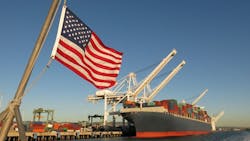Makers of motor vehicles and parts employed an estimated 926,100 people in the U.S. in October (seasonally adjusted), according to Nov. 4th jobs report from the Bureau of Labor Statistics.
That's pretty much unchanged from 926,200 in June, up from 922,000 in October 2015, and way up from a low of 623,300 in the depths of the recession in June 2009.
Yes, the number has been much higher in the past:
But compared with the manufacturing sector as a whole, the motor vehicle industry (cars and trucks, basically; farming and construction equipment are in a different category) has held up relatively well.
This is in part because the vast majority of cars and light trucks bought in the U.S. are still made in the U.S.
The domestic share tends to fall when gasoline prices are high and compact cars are in vogue, and rise when gas prices are low and sport utility vehicles and pickups are hot. But overall it's about where it was in the 1980s. One reason is that, since the 1980s, foreign auto manufacturers have shifted production to the U.S. in a big way.
I'm headed out later this morning to the 15-year-old facility about 40 miles east of Birmingham, Alabama, where Honda makes Odyssey minivans, Ridgeline pickups, and Pilot and Acura MDX SUVs. Alabama is also home to Mercedes and Hyundai auto-assembly plants and a Toyota engine plant. Other states (mainly Southeastern states) have attracted other foreign brands.
Foreign automakers built these facilities on U.S. soil in part to be closer to American consumers and their unique tastes in automobiles. But saber-rattling by U.S. politicians angered by the rise of Japanese imports in the 1980s played a role, too -- Japanese companies didn't want to risk losing access to the U.S. market, so they started building cars here.
It's a case where tough talk on trade, and actual tariffs, seem to have preserved jobs. On the other hand, the U.S. has been losing out to Mexico in some recent plant-location decisions in part because Mexico has more free-trade agreements that allow manufacturers there to ship duty-free to other countries. Sometimes trade barriers preserve jobs, sometimes they don't.
This column does not necessarily reflect the opinion of the editorial board or Bloomberg LP and its owners.
By Justin Fox
